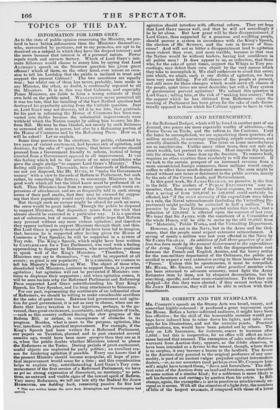ECONOMY AND RETRENCHMENT.
IN the Reformed Budget, which will be found in another part of our Journal, two points are more especially worthy of attention,—the Excise Taxes on Trade, and the reform in the Customs. Until the latter be accomplished, we are squandering three quarters of a million annually, to encourage smuggling, cripple commerce, and actually diminish the revenue. The taxes on home manufactures are as mischievous. Unlike many other taxes, they not only ab- stract wealth, but prevent its creation. Most imposts dip largely into the stream, but these dam up the fountain. To remove both; requires no other exertion than resolutely to will the removal. If we look to the certain prospect of an increased revenue from a more unrestricted foreign commerce, three millions would amply suffice to effect these much-desired measures. The sum might be raised without new taxes or detriment to the public service, merely by the sale of the Crown Lands, and Retrenchment.
In this good work, Sir JAMES GRAHAM, we perceive, is the first in the field. The readers of "PUBLIC EXPENDITURE may re- member, that, from a review of the Naval expense, we concluded that a saving of from 200,000/. to 300,000/. could certa.inl3. be effected, but "if the strict necessity of the expenditure were taken as a rule, the Naval retrenchments (including the Victualling De- partment) might probably be extended to half a million." We perceive by the Navy Estimate, printed within this week, that a reduction of 220,000/, is effected upon the amount of last year. We trust that Sir JAMES, with the assistance of a Committee of the whole House, will be able to make up the odd S0,000/. from the "Materials," Public Works, and the Victualling Department.
However, it is not in the Navy, but in the Army and the Ord- nance, that the people must expect extensive retrenchment. A saving of nearly a million was last year effected in the Navy by Sir 1. AMES GRAHAM. An addition of full three quarters of a mil- lion has been made by the present Government to the expenditure of the Army. Coupling this fact with the disproportionate cost between the French and English Armies, and the heavy outlay for the non-military department of the Ordnance, the public are entitled to expect a very extensive saving in these branches of the "Forces." Unless this be spontaneous, it must be compelled. Mr. HUME, Mr. GROTE, and every other practical member who has been returned to advocate economy,, must fight the Army Estimates item by item, not by eloquent denunciation, but by searching, specific, and close cross-examinations. To this they are pledged—for this they were elected: if they cannot reckon with Sir Josue HoBuousE, they will not be able to reckon with, their constituents.














 Previous page
Previous page